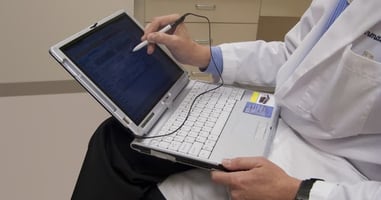As the age of electric health records begin to burgeon, the engagement between patient and...
Are Patient Notes by Residents Ready for Release to Patients?
 |
In this study, 128 outpatient treatment notes by the residents that were not marked as "highly confidential" were reviewed by a psychiatrist and a nonpsychiatrist (a third-year medical student who had completed a psychiatry rotation or an experienced psychiatry recreation therapist). The primary outcome was the question, "Overall, if a patient read this note, do you think they would be offended, confused, alarmed, injured, upset? Is the note written in a respectful tone, with sensitivity to culture, age, gender, sexual orientation, disability?" The researchers found that 70% of the notes were assessed as "no concern" by both reviewers, 23% were of "some concern," and 7% were of "major concern." There was a difference, however, between how the psychiatrists and the nonpsychiatrists perceived the notes, with 94% of nonpsychiatrists rating them as of "no concern" but only 72% of psychiatrists doing so.
Read more about this study in Academic Psychiatry.
(image: gelpi/shutterstock.com)




